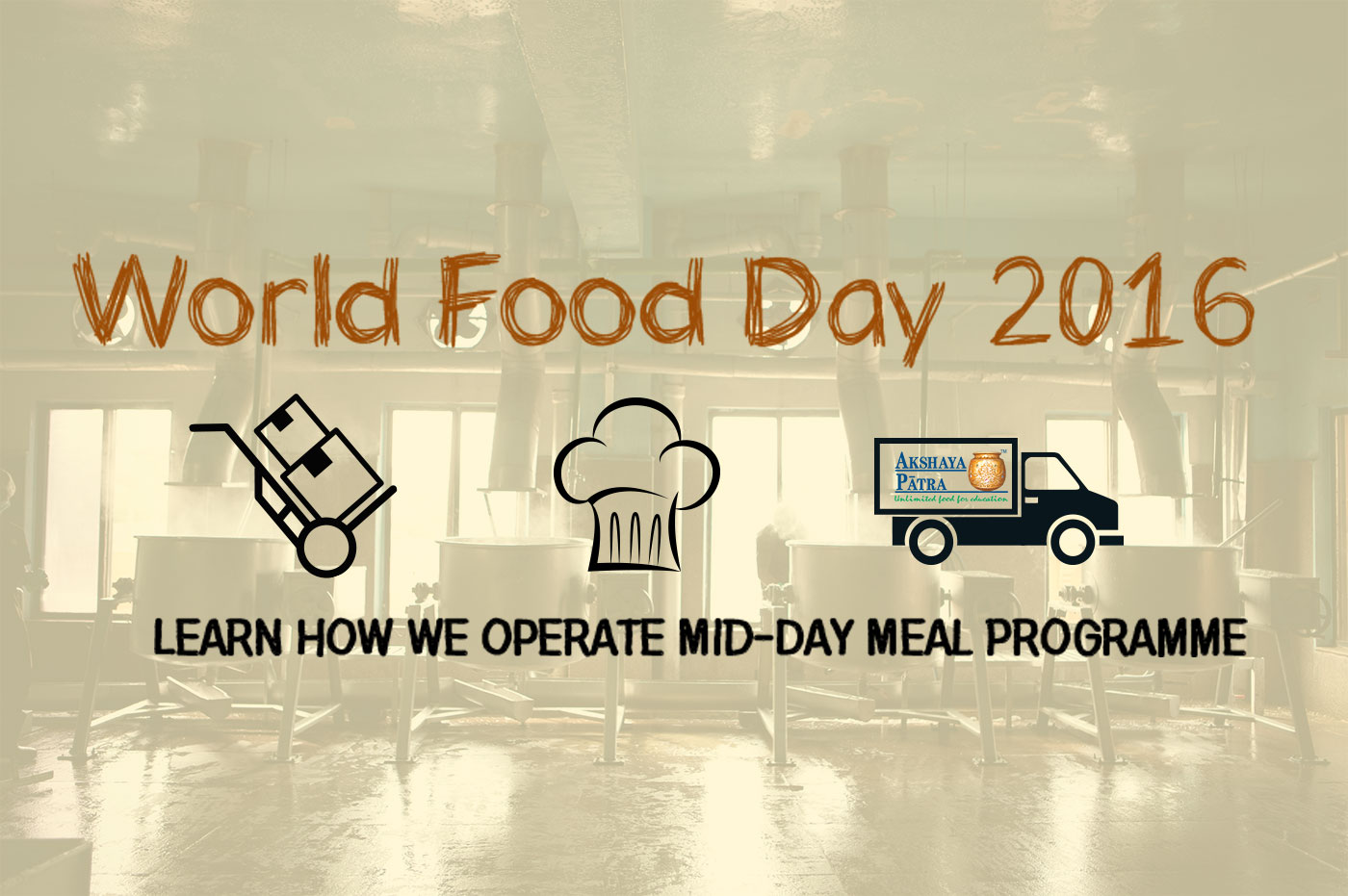On the occasion of World Food Day 2016, read about Akshaya Patra’s commitment to delivering high-quality meals to school children. The Foundation’s cause of food for education is the driving force behind its acclaimed Mid-Day Meal Programme.
Food is the most basic necessity that drives all life on earth and ensures that the circle of life continues without hindrance. Sadly, humanity, ever-expanding, is grappling with hunger and malnutrition, as a large number of people across the globe are deprived of their right to food security. The nations of the world recognise the need to tackle these issues, and hence, observe World Food Day 2016 on October 16, to commemorate the formation of the Food and Agriculture Organization of the United Nations in 1945.
For the past 16 years, Akshaya Patra has been devoted to the cause of ending classroom hunger, with a mission that no child should be deprived of education due to hunger. In 2016, the organisation reached an important milestone of having served 2 billion meals since its inception. Providing a meal a day for school children in 11 states across India is no mean feat. It involves strict adherence to quality – from the initial stages of procuring the ingredients to the cooking processes and the distribution of food. Here’s how the Foundation feeds school children – from crafting its meals to delivering them.
Procurement
The first step to a healthy meal is sourcing ingredients from credible sellers. Akshaya Patra trains its focus on avoiding middlemen and sourcing ingredients directly from manufacturers/farmers. The locations from which the ingredients are sourced are picked keeping in mind the logistics – sites closest to kitchens are chosen. The price for purchase of these materials is fixed by an internal joint committee and the Foundation continuously strives to reduce dependency on urban mandis.
Akshaya Patra follows Supplier Quality Management programme in selecting and approving vendors. These vendors, all of whom are licensed under Food Safety and Standards Authority of India (FSSAI) and follow the authority’s specifications for raw materials, are pre-audited by the quality team prior to approval. The ingredients are sourced from various entities, pan India:
- The pulses come from Gulbarga and Hubballi (Karnataka), Latur (Maharashtra), Indore (Madhya Pradesh) and Jaipur (Rajasthan)
- Vegetables are sourced from Cuttack (Odisha), Meerut (Uttar Pradesh) and local farmers in different locations
- Spices are bought from Guntur (Andhra Pradesh), Byadgi (Karnataka), Salem (Tamil Nadu), Jodhpur and Kota (Rajasthan), and Sangli (Maharashtra)
- Edible oil comes from Mangalore (Karnataka) and Kandla (Gujarat)
- Dairy is bought from Tirupati (Andhra Pradesh), Anand (Gujarat), companies like Mother Dairy
Quality and Preparation of Meals
Akshaya Patra’s mid-day meals are prepared with utmost care in its kitchens. The Foundation has implemented the ISO 22000 – food safety management system – a comprehensive, holistic approach to managing food safety. It helps organisations control food safety hazards throughout the food chain so that the food is safe at the time of consumption.
- Every stakeholder in the supply chain understands the responsibility he/she has been trusted with and does his/her job with utmost care to maintain the highest quality standards
- Quality assurance starts right from the recipe design. A high-quality recipe, designed keeping in mind taste as well as nutritional value, leads to a high-quality meal. Additionally, the mid-day meal recipes are designed keeping in mind the palate of beneficiary children
- The raw materials, as mentioned above, are accepted keeping in mind the FSSA 2006 specifications
- The raw materials then go to the Store Process stage, where they are correctly identified and stored, and retrieved as required. The First In First Out (FIFO) and First Expiry First Out (FEFO) methods are strictly followed when issuing these to the production department, where meals are prepared
- The raw material is meticulously sanitised using various methods. The cooking temperature is maintained at 90°C – 98°C and the vessels are sanitised with steam before food is packed in them
- Personal hygiene practices are strictly implemented and monitored
- All food contact surfaces are food grade (Stainless Steel 304 and food grade plastic)
- Vegetables, knives and cutting boards are sanitised with chlorinated water before cutting
- Vessels, cauldrons, trolleys, chutes, dal tank and other such equipment are sanitised with hot water before cooking
Distribution
Akshaya Patra’s wholesome mid-day meals are packed in sanitised, stainless steel vessels which control food temperature. They are designed to prevent any spillage. These vessels are then transported to beneficiary schools in customised, insulated delivery vans and are directly unloaded at schools. The Foundation maintains a track-sheet which records the contents in the vessels, along with their quantity, while they are being unloaded. The Akshaya Patra delivery vans are GPS-enabled, which allows monitoring of movements in real time. They also help in route optimisation and improve efficiency.
Thus, with meticulous attention to maintaining high-quality standards, Akshaya Patra has been providing tasty, healthy mid-day meals to school children across India. The Foundation’s immediate mission is to feed 5 million children across India by 2020. World Food Day is the perfect occasion to reassert commitment towards this cause and pool in resources to banish hunger. Do your bit and contribute today!







